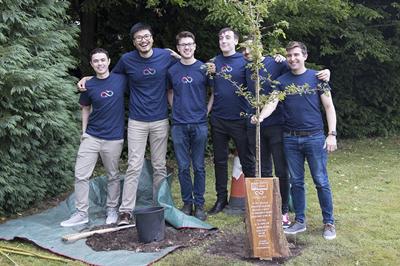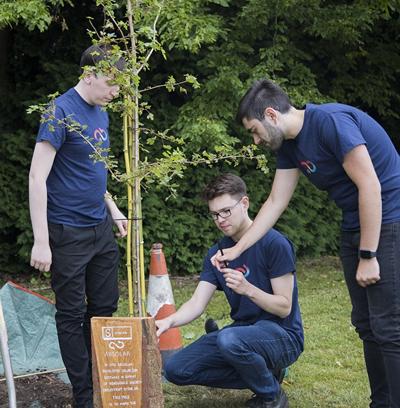Carbon negative student internships use AI to boost renewable energy deployment

Students from the University of Southampton have supported the development of machine learning models that remotely assess buildings for their solar power potential.
Three engineering and computer science students completed carbon negative internships at Southampton Science Park start-up Absolar this summer, where they contributed to an innovative project helping deploy renewable energy to the Isle of Wight.
MEng Aeronautics and Astronautics student Miguel Cano Puerto, MEng Electronic Engineering with Nanotechnology student Cameron Elliot and BSc Computer Science student Joshua Sanchez marked the project’s success by planting an acer campestre tree in the grounds of the Science Park.
Absolar, founded by entrepreneurial engineer Dr Phil Wu, is based upon years of cutting-edge research in the University’s Sustainable Energy Research Group.

This summer’s student work fed into an existing carbon negative project funded by the national Space Research and Innovation Network for Technology (SPRINT) programme. Josh, Miguel and Cameron spent four weeks extending their knowledge of software development, undertaking advanced data analysis and building machine learning models.
The technology will inform decision making by helping people understand whether solar power will save them energy costs.
Joshua says: “It was a really good opportunity to work with innovative technology and talented people, for the benefit of improving access to renewable energy with a project that I saw from start to finish.”
During the internship, the team visited the West Solent Solar Co-operative solar farm in Lymington to learn how solar PV operates and to see first-hand how communities can come together to generate green electricity in a sustainable manner.
To achieve carbon negativity the students were car sharing throughout. They also used carbon neutral IT suppliers and carried out offsets where carbon impact was unavoidable.
The tree planting ceremony was attended by many stakeholders, including Absolar’s partner in the project, Future Isle of Wight.
Nic Cory, Director at Absolar, says: “It’s fantastic to give students from the University of Southampton a chance to practice and develop their skills with real projects, especially ones that they get to see through to the end and that will make a tangible difference to local action on climate change.”